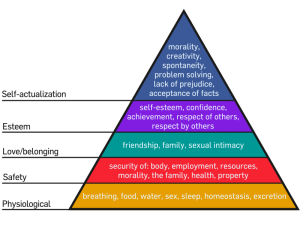Bismillah, was-salatu was-salamu ala rasoulellah,
In this paper I am going to present Abraham Maslow’s hierarchy of needs in the context of fulfilling human needs in Islam. I will provide examples from Qur’an and sunnah.

Islam is a complete way of life which was chosen by Allah, the creator of the heavens and the earth. Thus, Islam is totally appealing to human needs as it organises both physical and spiritual sides of the human being.
Abraham Maslow is a psychologist who is known for his hierarchy of needs theory. How far is this theory congruent with Islam? The following account will be touching on this issue.
-
Psychological needs
- Food and drink: Allah says in the Qur’an, “… and eat and drink and not be extravagant…” Qur’an (7:31)
- Marriage: Allah’s Messenger (PBUH) said, “O young people! Whoever among you can marry, should marry, because it helps him lower his gaze and guard his modesty (i.e. his private parts from committing illegal sexual intercourse etc.), and whoever is not able to marry, should fast, as fasting diminishes his sexual power.”[1]
- Sleep: Allah says in the Qur’an, “And He it is who made the night for you, and the sleep a rest, and He made the day to raise up again” Qur’an (25:47)
- Homeostasis: Allah says, “O man! What has beguiled you from your Lord, the Gracious one. Who created you, then made you complete, then made you symmetrical?” Qur’an (82:6-7)
- Excretion: before entering toilets, we should say, “ O Allah, I seek refuge with You from male and female devils “[2]
-
Safety needs
- Body, health and family:
- Allah says, “… and do not kill your people…” Qur’an (4:29)
- The prophet (PBUH) said, “…a husband is a guardian of his family and is responsible for it; a lady is a guardian of her husband’s house and is responsible for it…”[3]
- Employment: The Prophet (PBUH) said, “Allah said, ‘I will be an opponent to three types of people on the Day of Resurrection: -1. One who makes a covenant in My Name, but proves treacherous; -2. One who sells a free person and eats his price; and -3. One who employs a laborer and takes full work from him but does not pay him for his labour.’ “[4]
- Resources and property:
- Allah says, “… and do not squander wastefully.” Qur’an (17:26)
- Allah also says, “And do not swallow up your property among yourselves by false means” Qur’an (2:188)
- Morality: The prophet (PBUH) said, “‘The best among you are the best in character (having good manners)”[5]
-
Love and belonging needs
- Friendship: The prophet (PBUH) said, “A man is upon the religion of his friend, so let one of you look at whom he befriends.”[6]
- Family and intimacy: Allah said, “And one of His signs is that He created mates for you from yourselves that you may find rest in them, and He put between you love and compassion…” Qur’an (30:21)
-
Esteem needs
- Self-esteem and confidence: There is a weak hadith narrated by Imam At-Tirmdhi which says, ” Do not let yourselves be ‘yes-men’, saying: ‘If the people are good then we will be good, and if they are wrong then we will be wrong.’Rather, make up your own minds, if the people are good then you are good, and if they are evil, then do not behave unjustly.”[7]
- Respect: Allah says, “O you who believe! Let not people laugh at other people perchance they may be better than them, nor let women laugh at other women, perchance they may be better than them; and do not find fault with your own people nor call on another by nicknames, evil is bad name after faith… ” Qur’an (49:11)
-
Self-actualisation needs
- Creativity, spontaneity and problem solving: When the prophet (PBUH) stopped near Badr just before the battle and Al Hubab Ibn Al Munzir asked him if it was inspired to the prophet by Allah or if it was resulted from war and consultation. When the prophet said it was war and consultation, the companion suggested better strategy and the prophet accepted it.[8]
- Lack of prejudice and acceptance of facts: Allah says, ” O you who believe! Be upright for Allah, bearers of witness with justice, and let not hatred of people incite you not to act equitably; act equitably, that is near to piety …” Qur’an (5:8)
To conclude, Islam, the religion revealed by the creator of the heavens and the earth, is fully in accordance with the needs of human beings as Allah is the creator of everything and He know better. Although Abraham Maslow did his best with his theory, Islam comes to encompasses further paradigms beyond man’s imagination.
Bibliography
Al-Bukhari. Sahih Al Bukhari. Edited by Muhammed Zohair bin Nasir An-Nasir. Dar Twq An-Najah, n.d.
al-Mubarakpuri, Saifur Rahman. Ar-Raheeq Al-Makhtum. n.d.
At-Tirmidhi. Snan At-Tirmidhi. Edited by Bashar Awwad Ma’roof. Darul Gharb Al Islami, Bairut, n.d.
Braik, Sheikh Saad Al. قيمة الاحترام في الإسلام. n.d. http://www.saadalbreik.com/Sad/news.php?action=show&id=448 (accessed Jul 2, 2013).
collections. n.d. sunnah.com (accessed June 19, 2013).
Islam QA. n.d. http://islamqa.info/ar/ref/137155 (accessed Jul 2, 2013).
Maslow’s Hierarchy of Needs. n.d. https://en.wikipedia.org/wiki/File:Maslow%27s_Hierarchy_of_Needs.svg (accessed Jul 1, 2013).
Muslim. Sahih Muslim. Edited by Muhamed Foad Abdel Baqi. Dar Ihyaa’ At-Turath Al Arabi, Bairut, n.d.
Quran Explorer. n.d. http://www.quranexplorer.com/quran/ (accessed Jul 1, 2013).
Zuhd, Dr. Essam El Abd. The Miracle Verses and its Impact about Sleeping in Quran. Gaza: www.iugaza.edu, 2010.
الأبيضي, محمد بن عبده آل محمد. إجابة السائل عن حديث المرء على دين خليله فلينظر أحدكم من يخالل . Sep 20, 2005. http://www.ahlalhdeeth.com/vb/showthread.php?t=38249 (accessed Jul 2, 2013).
المكتبة الشاملة. Vol. 3.48. Spnsored by www.arrawdah.com. n.d.
صيد الفوائد. n.d. www.saaid.net/ (accessed Jul 1, 2013).
[1] Sahih Al Bukhari, vol. 7, pp. 3, no. 5066
[2] Sunan Abee Dawood, vol.2, pp.2, no.4
[3] Sahih Al Bukhari, vol. 3, pp. 120, no. 2409
[4] Sahih Al Bukhari, vol. 3, pp. 90, no. 2270
[5] Sahih Al Bukhari, vol. 8, pp.13, no. 6035
[6] Sunan At-Tirmidhi, vol. 4, pp. 167, no. 2378
[7] Ibid, vol.3, pp.432, no. 2007
[8] Ar-Raheeq Al-Makhtum, pp. 98




